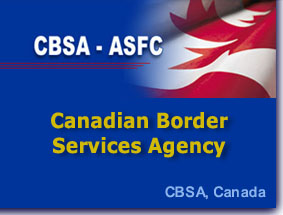 FORT FRANCES – Crimebeat – The Canada Border Services Agency (CBSA) facilitates the entry of legitimate travellers and goods, while protecting the safety and security of Canadians and ensuring that Canada’s border is not used for illegal activity. This work is carried out by CBSA border services officers (BSOs) who ensure that the people, goods and conveyances entering Canada meet all requirements and are compliant with Canadian law.
FORT FRANCES – Crimebeat – The Canada Border Services Agency (CBSA) facilitates the entry of legitimate travellers and goods, while protecting the safety and security of Canadians and ensuring that Canada’s border is not used for illegal activity. This work is carried out by CBSA border services officers (BSOs) who ensure that the people, goods and conveyances entering Canada meet all requirements and are compliant with Canadian law.
In September, CBSA officers at the Fort Frances port of entry (POE) processed more than 96,000 travelers in 46,000 vehicles, and 986 commercial trucks. Thirty-two charter buses and 1,700 pedestrians were processed during the month. The CBSA also conducted over 1,500 secondary examinations for customs purposes.
IMMIGRATION: Officers at the Fort Frances POE conducted more than 2,500 immigration interviews resulting in the issuance of 13 work permits, 34 visitor records and 143 Remote Area Border Crossing (RABC) permits. Fifty-eight individuals were found to have various admissibility issues, of which 42 were refused entry to Canada. The other 16 individuals were allowed entry on a temporary visitor permit.
On September 3, two U.S. residents arrived at the Fort Frances POE and stated that their intention was to go on a fishing trip and stay at a private cabin. During a routine examination of their vehicle, BSOs discovered undeclared building materials and tools. Furthermore, the individuals did not have any fishing gear with them. Both individuals work as carpenters in the United States, and they admitted that they were coming to Canada to do some work on the cabin. They were refused entry to Canada as they were not in possession of valid work permits and did not meet the criteria to be issued one at the POE.
On September 4, a U.S. resident was refused entry to Canada for serious criminality. He had convictions for criminal sexual conduct in the second degree with a child and failing to comply with his conditions in regards to the sex offender registry. He had previously been denied entry to Canada on two other occasions. As a result of his criminality, he was denied entry to Canada.
On September 10, a U.S. resident arrived at the Fort Frances POE on a bicycle with all of his worldly possessions. His stated intention was to travel to Winnipeg. Routine background checks revealed that the individual had criminal convictions in at least 10 different states. He also had previously been denied entry to Canada.
On September 12, a U.S. resident from Texas was referred for an immigration interview after declaring his intention to rent an apartment in Fort Frances and take up residency. During the interview, the individual explained that he supported himself by playing online poker. The individual stated that he was financially independent but was unable to prove that he had funds to support himself while in Canada, nor could he prove that he had employment or a residence to go back to in the United States. He was refused entry as a non bona fide visitor.
CUSTOMS: In September, CBSA officers conducted over 1,500 secondary examinations for customs purposes, initiated 13 seizure actions and issued an additional 15 written warnings for non-declared or undervalued goods.
On September 9, a returning Canadian resident imported a boat, motor and trailer package which he declared as having a value of US$14,000. Officers found an ad on the Internet for the same boat with an asking price of US$22,000. During the interview, the individual admitted that he had actually paid US$20,500 for the package and said that he declared a lower value in order to save on import taxes. The boat, motor and trailer were seized for undervaluation and released back to the individual upon payment of more than $3,500 in penalties. Had the full value been properly declared, the taxes payable would have been approximately $845.
On September 10, two Canadian residents returning from an overnight trip to Minnesota were referred for a secondary examination. At primary, the couple declared $200 worth of goods that were being imported. The female traveller provided several receipts to the BSOs which accounted for the declared goods; however, upon opening the trunk of the vehicle, the officers noted several bags of goods that were not accounted for on the receipts. In total, approximately $367 worth of undeclared clothing and miscellaneous items were discovered. The goods were seized for non-report and returned to the individuals upon payment of $251 in penalties.
On September 16, two Nevada residents arrived at the Fort Frances POE seeking entry to Canada for a two-week trip. They were referred for a secondary examination and during the examination of their motor home, BSOs discovered more than 20 litres of undeclared wine and tequila. The undeclared alcohol was seized with no terms of release and the individuals were allowed to enter Canada without further penalties.
Travel Tips: The CBSA reminds all travelers to truthfully declare all purchases when returning to Canada and to be mindful of the following: after an absence of 24 hours, you may bring back $50 worth of goods duty- and tax-free; after 48 hours, your personal exemption is $400; and after an absence of seven days, you are entitled to $750 worth of duty-and tax-free goods. There are no personal exemptions for same-day purchases.
